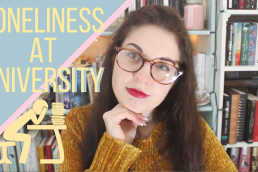Image credit: Joshua Slitt, via Unsplash | Illustrations: Ida Henrich
All LGBTQ+ people are, of course, very different and so there are many multifaceted reasons why mental illnesses may come into our lives – just like the many reasons it may come into the lives of heterosexual people. There are, however, unique challenges and pressures (such as stigma and prejudice around sexuality and gender) that LGBTQ+ people face – these may trigger, exacerbate or even cause emotional or mental distress.
These challenges can often also mean LGBTQ+ people find it extra difficult to see a support system for themselves, so don’t seek or find the help they need. Pressures can then be even further advanced if an LGBTQ+ person has to deal with additional racial or ablest environments, which many unfortunately do.
Coming out 
A particular challenge that almost all LGBTQ+ people have to consider at one time or another is “coming out”, in other words, making the decision to tell people that your sexuality or gender might not be what they expected. Some people never come out, some have a very easy experience and many others are only “out” in certain parts of their lives. Regardless, it’s an emotionally trying experience to even contemplate and it’s a particularly important time to ensure you put your mental health first, especially if you expect that it’s not going to be an easy discussion with someone.
If you’ve decided you’re not yet ready to tell anyone about your sexuality that’s okay too, and I see you! I didn’t either for a very long time and I haven’t told everyone yet. Practising the things you usually enjoy or find good for self care (meditation, breathing exercises, walks with music, art, a favourite treat or hobby, cuddling a pet and watching Netflix) can be vital little ways to mind yourself. But if you’re thinking about coming out soon, here are some important things to remember.
Don’t rush yourself
If you’ve decided you’d like to tell people something new about your gender or sexuality, it’s okay to take a deep breath and go easy on yourself. There’s not often a deadline on these things, and you should factor in your own personal circumstances to decide when, and who, would be best suited to hearing. A lot of people find it helpful to come out to just a few close and trustworthy people first in order to get used to it – this is something that worked for me.
I also had to factor in that I had a lot of other things to deal with along the way. For example, coming out to family during an emotionally turbulent period or even to friends during exam time might be a lot to handle all at once.
You might, like I was, be too preoccupied trying to take care of your health and need to wait until you are feeling a little better before coming out. It’s more than okay to allow yourself a bit of a wait if you’re not mentally ready to have a conversation. That said, it’s often a huge weight off when people do decide share their identity! So many people have come out before, and countless others will do so in the future. I found it helpful to remember that there are LGBTQ+ everywhere and plenty of us are doing just fine.
Safety first
Not everyone has trustworthy people in their lives, and sometimes people find they need to come out in a very conservative circle or to a group of people who may not agree with LGBTQ+ rights. In these cases, it is extra important to try to take care of yourself when coming out. If you’re about to come out to someone who you think might take it very badly – and remember, they may take it better than you think – telling someone you trust and arranging to meet them afterwards to schedule some positivity is a good way to make sure you’re looked out for and have someone there for you.
If you find someone very negative over a long course of time, you’re more than entitled to take a step back from them and tell them you can connect again when they are willing to be more respectful. Of course, this is difficult or even impossible if you are dependent on them and so finding a positive person to speak to might help balance the situation instead. For really big emergencies, the UK is lucky to have organisations like The Albert Kennedy Trust: https://www.akt.org.uk/.
Find someone who understands
If you haven’t got an ally remember there are plenty waiting out there for you. There is a very good coming out guide which can be found on Stonewall.org.uk, and there are some excellent resources and supports on LGBT Youth Scotland’s website.
If you’re in a social circle that isn’t accepting of LGBTQ+ identities, finding other like-minded people, a good LGBTQ+ friendly counsellor or society/club can be a really rewarding starting point. If you feel isolated and unable to be yourself in your current situation, there is a directory of LGBTQ+ organisations on www.equality-network.org, and perhaps it’s good to search them on your phone or a library computer if you don’t wish to use a shared one at home, school or work. You don’t always have to attend a group in person, many counsellors and clubs will be happy to chat to you online or on the phone, so don’t discount that option outright. Something that helped me feel less alone was reading LGBTQ+ writers and books – and I know many others who found solace in LGBTQ+ friendly films, TV shows and online fanfictions.
How to be a good ally to someone coming out
It’s very easy to be a good friend and ally to someone who is coming out. The most important thing you can do is tell your friend you see them the same as always and then ensure you keep your friend’s trust. Telling someone that they can trust you and that you’re on their side may seem simple but it’s very important. Checking yourself and seeing if you need to work through your own internalized or externalized homophobia – however minor it may seem – is the most productive way to be a good ally in general.
It’s also important to respect that even you don’t have a problem with LGBTQ+ people and don’t see a reason why disclosing identity with you would be difficult, a person who comes out to you has probably had to build themselves up to tell you this new information. In addition, if you know someone who had a terrible time coming out or someone who had no trouble at all, referring back to that experience is not always very helpful when someone discusses the prospects of coming out to to others with you. Listening to understand, rather than to respond can often be the best route to good ally-hood.
Don’t “out someone”
It can also be very important not to “out” someone in other situations. In other words, just because someone has decided to tell you something about their gender or sexuality doesn’t mean that they have told everyone. It’s important to be tactful when referring to a person’s identity when you’re around other people who may or may not know about it – be they shared friends, family, colleagues, acquaintances or even people who don’t know the person at all. This remains the case even if discussions around identity are something that seem like no big deal between you and your friend. A good way to avoid “outting” someone is just to ask a person who exactly they are comfortable having know about what they’ve shared with you – or better still, stand back from discussing their identity until they decide to speak of it themselves which is a good time to show your support.






